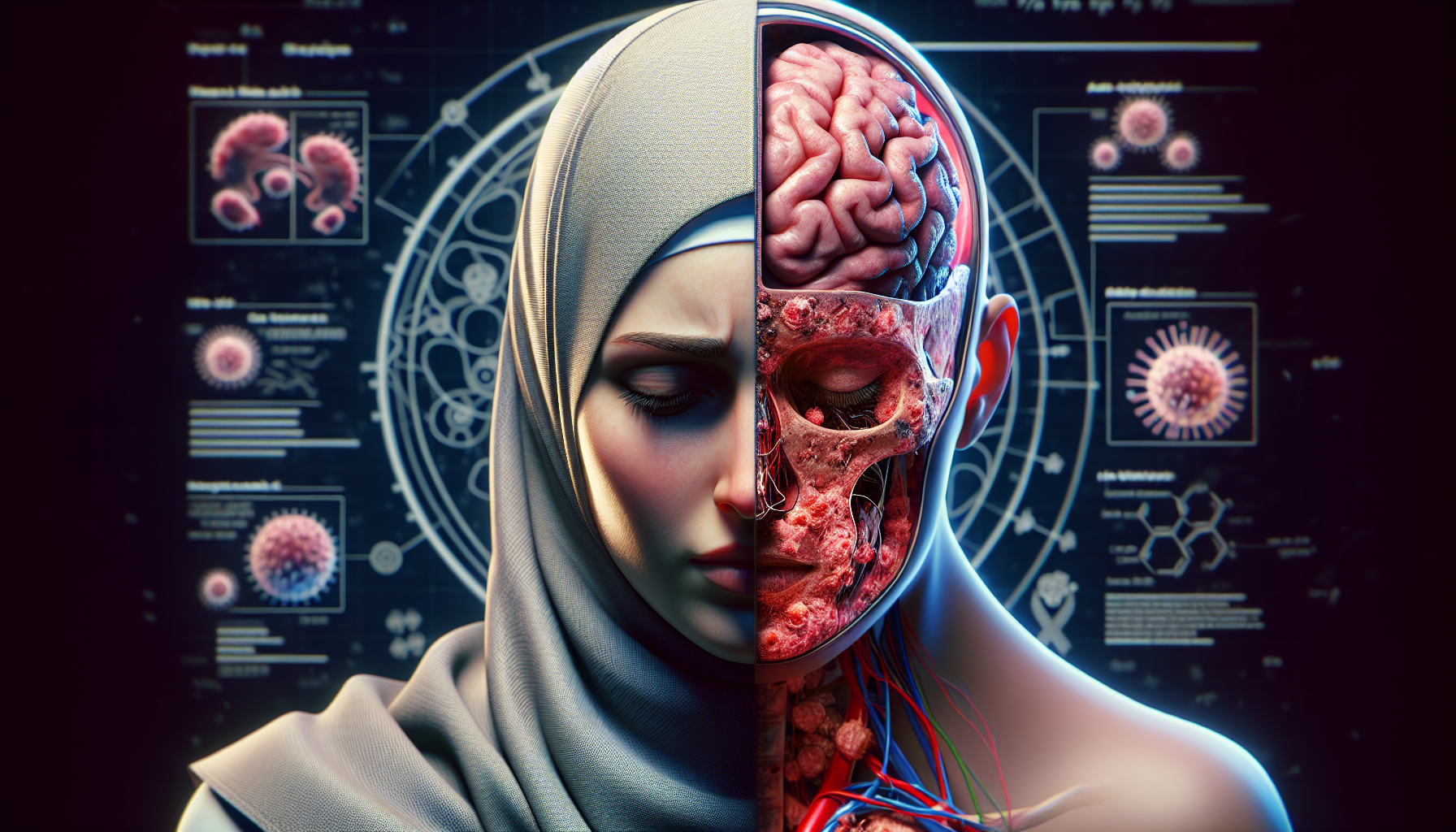In the intricate tapestry of human health, few topics ignite as much curiosity and debate as the connection between our minds and bodies. As the 21st century progresses, we find ourselves at a crossroads where ancient wisdom and cutting-edge science converge, inviting us to explore the profound relationship between our emotional states and physical health. 🌿 At the heart of this exploration lies a provocative question: Can our emotions, both conscious and subconscious, play a significant role in the development of diseases such as cancer? This question, while steeped in controversy, opens the door to a world of possibilities and insights, promising a transformative understanding of how we perceive and manage our health.
For centuries, holistic health traditions have embraced the belief that emotional well-being is intrinsically linked to physical health. Modern science, with its rigorous methodologies and empirical evidence, is beginning to uncover threads that support these ancient claims. This blog delves into the emerging theories that explore how emotions might influence the onset and progression of cancer, a disease that remains one of the most formidable challenges in modern medicine. We will unravel the complex interactions between psychological stress, immune function, and cellular processes, and how these might collectively influence cancer risk and progression.
One of the key areas we will explore is the impact of chronic stress and emotional trauma on our bodies. Stress, often dubbed the “silent killer,” can trigger a cascade of biological responses that might compromise immune function and promote an environment conducive to cancerous growth. But how does this happen? By examining the latest research, we will delve into the mechanisms by which stress hormones, such as cortisol, can affect cellular health and potentially contribute to oncogenesis. Additionally, we will look into the intriguing field of psychoneuroimmunology, which studies how our thoughts and feelings can influence our immune system’s ability to fight cancer cells.
As we journey through these theories, it is equally important to discuss the potential for emotional healing as a component of cancer prevention and treatment. We will highlight the growing body of evidence suggesting that interventions aimed at reducing stress and promoting emotional well-being can have tangible effects on health outcomes. Mindfulness practices, meditation, and therapy are not just buzzwords; they represent a paradigm shift towards a more integrated approach to health that considers the mind as an ally in healing. By understanding and addressing emotional factors, we may unlock new pathways for enhancing traditional cancer treatments and improving patient quality of life.
Finally, we will confront the skepticism and ethical considerations surrounding the mind-body connection in cancer care. While the science is still evolving, and not all researchers agree on the causative links between emotions and cancer, the potential implications are too significant to ignore. By fostering an open-minded yet critical approach, we aim to inspire further inquiry and dialogue among medical professionals, researchers, and patients. This exploration is not just about understanding the science; it is about empowering individuals to take a proactive role in their health, embracing a holistic view that acknowledges the profound unity of mind and body. 🌟
The Interplay Between Mind and Body: An Introduction
The relationship between the mind and body has long been a subject of fascination and exploration within both scientific and holistic communities. This connection plays a critical role in our overall health, influencing everything from stress levels to chronic diseases. In recent years, a growing body of research has suggested a link between emotional states and the development of cancer, sparking debates and further investigations. Understanding the mind-body connection involves delving into how our emotions can impact physical health, especially in relation to complex diseases like cancer.
At the heart of this exploration is the psychosomatic theory, which suggests that psychological processes can affect the physical functioning of the body. This theory posits that emotions such as stress, anger, and anxiety may contribute to the onset or progression of diseases by affecting hormonal and immune responses. For example, chronic stress is known to weaken the immune system, which is crucial in fighting off cancer cells. Moreover, emotional well-being is increasingly recognized as an important factor in recovery and survival rates among cancer patients.
Despite the promising evidence, the link between emotions and cancer remains contentious, primarily due to the complex nature of both fields. Researchers are divided on how much influence emotional states exert on cancer development, with some emphasizing genetic and environmental factors as more significant. However, the potential for emotional and psychological interventions to complement traditional cancer treatments offers a hopeful avenue for improving patient outcomes and quality of life.
Theories Linking Emotions and Cancer
Several theories have been proposed to explain how emotions might influence cancer development. One of the most prominent is the theory of psychoneuroimmunology (PNI), which explores the interaction between psychological processes, the nervous system, and the immune system. According to PNI, stress and negative emotions can alter immune function, potentially creating an environment conducive to cancer cell growth.
Another theory revolves around the concept of emotional suppression, which suggests that consistently repressing emotions like anger or sadness can lead to physical manifestations, including cancer. This idea is rooted in the notion that unresolved emotional conflicts may create chronic stress responses, disrupting the body’s hormonal balance and immune function.
Moreover, the lifestyle and behavioral theory posits that emotions influence behaviors that could affect cancer risk. For example, individuals experiencing chronic stress or depression might engage in unhealthy behaviors such as smoking, excessive alcohol consumption, or poor diet, which are known risk factors for cancer. While these theories offer valuable insights, they also highlight the need for further research to fully understand the intricate connections between emotions and cancer.
Exploring Psychoneuroimmunology: A Deeper Dive
Psychoneuroimmunology (PNI) is a fascinating field that bridges psychology, neuroscience, and immunology to understand how mental and emotional states impact the immune system. The immune system plays a pivotal role in identifying and destroying cancer cells, making its interaction with emotions a crucial area of study. PNI research has revealed that stress can suppress the immune response, potentially facilitating the growth and spread of cancer cells.
Stress-induced immunosuppression occurs through the release of stress hormones like cortisol, which can inhibit the activity of immune cells responsible for detecting and eliminating cancerous cells. Chronic stress may also lead to inflammation, a condition linked to various types of cancer. By understanding these mechanisms, researchers are exploring interventions such as stress management techniques and psychotherapy to enhance immune function and improve cancer outcomes.
In the realm of PNI, studies have examined the effects of various psychological interventions on cancer patients. Techniques such as cognitive-behavioral therapy, mindfulness, and relaxation exercises have shown promise in reducing stress and improving immune function. By fostering positive emotional states, these interventions may not only improve patients’ quality of life but also bolster their body’s natural defenses against cancer.
Emotional Suppression and Its Consequences
The theory of emotional suppression suggests that consistently repressing or ignoring emotions can have detrimental effects on physical health. Emotions such as anger, fear, and sadness are natural responses that, when unaddressed, may lead to chronic stress and physiological imbalances. This concept is particularly relevant in the context of cancer, where emotional suppression might contribute to disease development or progression.
Research indicates that individuals who habitually suppress their emotions may experience heightened levels of stress hormones, inflammation, and immune dysfunction. These physiological changes create an internal environment that may favor the growth and spread of cancer cells. Additionally, emotional suppression can affect mental health, potentially leading to depression and anxiety, which are known to impact overall well-being and recovery in cancer patients.
Recognizing the potential harm of emotional suppression has led to the development of therapeutic approaches aimed at encouraging emotional expression and processing. Techniques such as expressive writing, art therapy, and counseling provide individuals with safe outlets to explore and release emotions, potentially mitigating their negative impact on health. Encouraging emotional openness and resilience is an important aspect of holistic cancer care.
The Role of Lifestyle and Behavior in Cancer Risk
The lifestyle and behavior theory posits that emotions influence behaviors that can affect cancer risk, emphasizing the interconnectedness of mental health and lifestyle choices. Stress, depression, and anxiety can lead individuals to adopt unhealthy habits such as smoking, excessive alcohol consumption, poor diet, and lack of physical activity, all of which are established risk factors for cancer.
For instance, stress can trigger cravings for high-fat, high-sugar foods, leading to weight gain and obesity, a known risk factor for various cancers. Similarly, individuals experiencing depression or anxiety may turn to substances like tobacco or alcohol as coping mechanisms, further increasing their cancer risk. Understanding these behavioral links provides opportunities for targeted interventions aimed at reducing cancer risk through lifestyle modifications.
Programs that combine psychological support with lifestyle coaching have shown success in promoting healthier habits among individuals at risk of or diagnosed with cancer. By addressing the emotional and behavioral aspects of cancer risk, these interventions empower individuals to make positive changes that support their overall health and well-being.
Comparative Analysis: Emotional Interventions in Cancer Care
The integration of emotional and psychological interventions in cancer care has gained traction, with various approaches showing promise in enhancing patient outcomes. Below is a comparative analysis of some commonly used interventions:
| Intervention | Description | Benefits |
|---|---|---|
| Cognitive-Behavioral Therapy (CBT) | A structured, goal-oriented therapy focused on changing negative thought patterns. | Reduces stress and anxiety, improves coping skills, and enhances quality of life. |
| Mindfulness-Based Stress Reduction (MBSR) | A meditation-based program aimed at increasing awareness and acceptance of the present moment. | Decreases stress, boosts emotional regulation, and improves immune function. |
| Expressive Writing | A therapeutic writing practice encouraging emotional expression and processing. | Facilitates emotional release, reduces stress, and may improve immune parameters. |
These interventions highlight the potential of emotional care to complement medical treatments, offering a more holistic approach to cancer care. By integrating emotional and psychological support into treatment plans, healthcare providers can address the multifaceted needs of cancer patients, ultimately improving their overall well-being and treatment outcomes.
Emerging Research and Future Directions
As the field of mind-body medicine continues to evolve, emerging research is uncovering new insights into the emotional origins of cancer. Studies utilizing advanced imaging techniques and biomarker analyses are providing a deeper understanding of how emotions and stress affect biological processes related to cancer development. This research is paving the way for innovative approaches to cancer prevention and treatment that incorporate emotional and psychological factors.
One promising area of investigation is the role of positive emotions and psychological resilience in cancer outcomes. While much focus has been on the negative impact of stress and emotional suppression, cultivating positive emotions such as joy, gratitude, and hope may have protective effects against cancer. Research suggests that positive emotional states can enhance immune function, reduce inflammation, and improve overall health, offering a potential avenue for promoting resilience in cancer patients.
Moreover, the integration of technology in mind-body research is expanding possibilities for personalized interventions. Mobile apps, wearable devices, and digital platforms are being developed to monitor emotional states and provide real-time feedback and support. These tools offer the potential for individuals to actively engage in their emotional health, track progress, and receive tailored interventions that align with their unique needs and circumstances.
- Explore further with this video on YouTube titled “The Mind-Body Connection in Cancer Care” from the Health Science Channel.
The ongoing exploration of the mind-body connection in cancer care continues to yield valuable insights, with the potential to revolutionize how we understand and address this complex disease. By embracing a holistic approach that considers emotional, psychological, and biological factors, we can enhance cancer prevention, treatment, and survivorship, ultimately improving the lives of those affected by cancer.

Conclusion
Unlocking the mind-body connection has long been a subject of intense curiosity and profound implications, particularly when it comes to understanding the intricate links between emotional well-being and physical health. In this exploration of theories connecting emotional origins to cancer, we have traversed a wide spectrum of ideas, research, and anecdotal evidence that illuminate this complex relationship.
Throughout this article, we delved into various psychological theories and scientific studies suggesting that emotions can influence cancer progression and outcomes. We began by examining the historical context, noting how ancient healing practices often emphasized the interconnectedness of mind and body. This perspective has been echoed in modern research, which increasingly supports the notion that psychological stress and emotional states may play a role in the onset and progression of cancer.
One of the key points discussed was the impact of chronic stress and negative emotions on the immune system. Studies have demonstrated that prolonged exposure to stress can weaken immune defenses, potentially allowing cancer cells to grow unchecked. Moreover, we explored the mechanisms by which stress hormones like cortisol can alter cellular environments, promoting conditions conducive to cancer development.
Additionally, we examined the role of emotional resilience and positive psychology in cancer outcomes. It is becoming increasingly clear that individuals who cultivate a positive outlook and manage stress effectively often experience better health outcomes. This resilience is not merely a matter of attitude but involves tangible biological changes, such as improved immune function and reduced inflammation.
The mind-body connection also extends to behavioral changes prompted by emotional states. For instance, individuals experiencing depression or anxiety might be less likely to engage in healthy behaviors, such as exercising, eating a balanced diet, or adhering to medical advice, which could indirectly influence cancer risk and progression.
Importantly, our exploration highlighted the burgeoning field of psychoneuroimmunology, which seeks to understand how psychological processes influence the nervous and immune systems. This interdisciplinary approach is crucial for unraveling the complex pathways linking emotions to physical health outcomes, including cancer.
As we conclude, it is essential to reinforce the significance of the mind-body connection in both cancer prevention and treatment. Recognizing the power of emotions in influencing physical health empowers individuals to take a holistic approach to wellness. This includes prioritizing mental health, fostering emotional resilience, and integrating stress-reduction techniques into daily life.
The implications of this understanding are vast, not only for individuals but also for healthcare systems, which can benefit from integrating psychological care into cancer treatment protocols. As we continue to uncover the depths of the mind-body connection, it is crucial for researchers, practitioners, and patients alike to remain open to the possibilities this knowledge presents.
We encourage you, the reader, to reflect on the insights gained from this exploration. Consider how emotional well-being might be influencing your own health and take proactive steps to nurture both mind and body. Whether it’s through mindfulness practices, therapy, or simply fostering positive relationships, each action contributes to a healthier, more balanced life.
In closing, we invite you to share your thoughts and experiences on this topic. Engaging in discussions not only broadens our understanding but also builds a supportive community that can drive further inquiry and innovation. Share this article with friends, family, or colleagues who might benefit from these insights. Let’s work together to unlock the full potential of the mind-body connection in enhancing health and well-being. 🌱
For further reading, consider exploring resources from reputable organizations and research institutions. The National Institutes of Health (https://www.nih.gov) and the American Psychological Association () offer valuable information on the interplay between mental and physical health.
Thank you for joining us on this enlightening journey. Let’s continue to explore, learn, and grow together in our understanding of the powerful connection between mind and body.
Toni Santos is a visual storyteller and conceptual archivist whose work explores the curious, often poetic ruins of pseudoscience and obsolete theories. With a reverence for forgotten frameworks and fantastical logic, Toni illuminates the imaginative spaces where science once drifted into myth, speculation, and symbolic belief.
His creative path is rooted in a fascination with the fringe — from phrenology maps to ether diagrams, hollow earth charts to animal magnetism illustrations. Each visual Toni creates or curates is an invitation to reexamine the strange beauty of discarded knowledge — not as failure, but as cultural reflection, as art born from our eternal desire to explain the unexplainable.
Blending visual design with historical inquiry, Toni gives new life to lost diagrams, metaphysical charts, and antique engravings that once shaped worldviews. His work occupies the liminal zone between fact and fiction, where obsolete models still pulse with philosophical resonance and forgotten charm.
As the mind behind Vizovex, Toni shares illustrated essays, curated collections, and visual reinterpretations that invite others to explore the aesthetic and symbolic value of outdated theories. His goal is not to validate, but to remember — to view these speculative systems as relics of human creativity, vulnerability, and yearning.
His work is a tribute to:
The elegance of error in the evolution of knowledge
The symbolic artistry of discarded explanations
The blurred lines between belief, observation, and imagination
Whether you’re a collector of curious ideas, a lover of forgotten diagrams, or someone drawn to the strange scaffolding of old worldviews, Toni opens a portal to a time when the universe was still full of ghosts, humors, and cosmic fluids — one chart, one symbol, one discredited wonder at a time.





